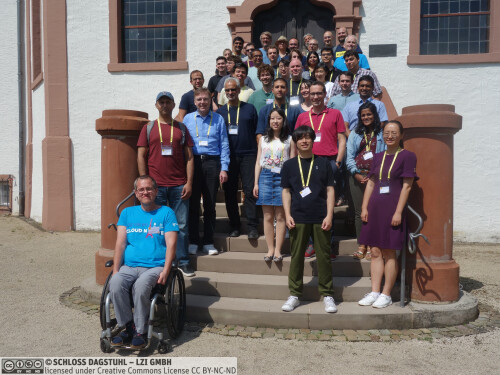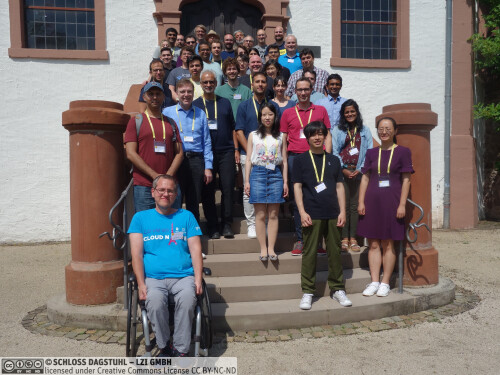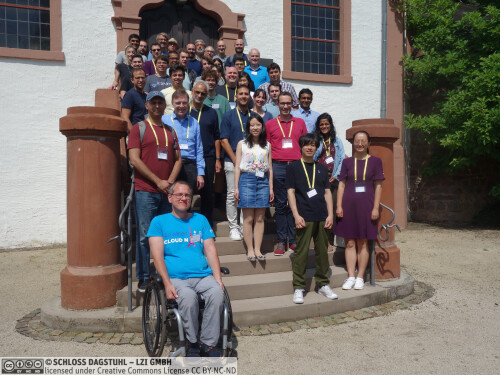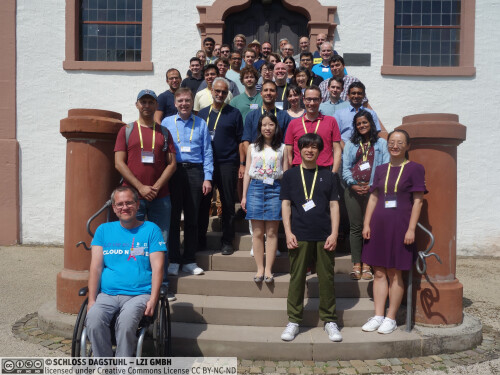Dagstuhl Seminar 24291
Programmable Host Networking
( Jul 14 – Jul 19, 2024 )
Permalink
Organizers
- Gianni Antichi (Polytechnic University of Milan, IT)
- Katerina Argyraki (EPFL - Lausanne, CH)
- Aurojit Panda (New York University, US)
- Justine Sherry (Carnegie Mellon University - Pittsburgh, US)
Contact
- Marsha Kleinbauer (for scientific matters)
- Jutka Gasiorowski (for administrative matters)
Schedule
Over the past two-decades network link speeds have grown faster than processor clock speeds. Consequently, the software and hardware that applications use to communicate is often the bottleneck. Eliminating this bottleneck requires redesigning the software network stack and hardware NICs that applications use to send or receive messages. Until now changing either was challenging, but recent changes to the software ecosystem have made it possible to prototype, and then deploy new network stack and NIC designs. On the software side, the addition of eBPF to the Linux and FreeBSD kernels have made it easier to modify the network stack without needing to change the kernel, while on the hardware side, the availability and adoption of programmable SmartNICs such as Xilinx Alveo and Intel Agilex allows us to now change both NIC design and the NIC-OS interface without needing to upgrade or change server hardware.
However, at present there is no consensus on how NIC-OS-Userspace should be architected, what features they should provide, or how they should be implemented. This is because answering these questions requires combining techniques and ideas from several sub-disciplines including networking, systems, computer architecture, programming languages, and compiler design. This seminar's goal was to bring together academics and industry practitioners who had expertise in these areas and discuss how to best architect and build platforms that enable accelerator use.
We structured the seminar around four core questions:
- What hardware accelerators are used in practice, and how?
- What interfaces do current OS accelerator frameworks provide, what are their limitations, and how are they used?
- How do hardware accelerators communicate and coordinate with processors?
- What tools do we have available to reason about the performance of both hardware and software accelerators?
The choice of questions was informed by the set of attendees, and by the organizers experiences in this area. Surprisingly we found that there was significant disagreement on the desirability of both hardware and software accelerators, with many of the attendees arguing that they might be a temporary measure while we figure out what future servers look like. This is a different conclusion than what one would arrive at by looking at recent papers in the systems, networking, and architecture communities, and from current industry deployments. Our full report provides a more detailed account of the seminar's discussions.
 Gianni Antichi, Katerina Argyraki, Aurojit Panda, and Justine Sherry
Gianni Antichi, Katerina Argyraki, Aurojit Panda, and Justine Sherry
Most networked applications spend a significant amount of time on communication, and the software libraries and hardware used for communication often determines their performance (both throughput and latency), and their resource requirements. In the past decade, we have seen several efforts to improve communication performance and efficiency at the end-host. These include kernel bypass libraries such as DPDK, new kernel interfaces such as io_uring, in-kernel network offloads provided by XDP and eBPF, and SmartNICs of a variety of types. Each of these approaches makes trade-offs in terms of their performance, how easily they can be deployed (in private clusters and multi-tenant environments), their resource requirement, the reliability they provide, and how easy it is for programmers to use them when building networked applications. We are organizing this Dagstuhl Seminar to bring together people who work on systems, networking, programming languages, compilers, computer architecture, and distributed systems to work together to articulate and understand these trade-offs, and collectively propose approaches to improve usability, reliability, deployability, and analysis of high-performance networking software and hardware.
Why now? Finding approaches for building correct, resource-efficient networked applications that can provide low request latency and have high-throughput has been an ongoing concern since the emergence of the first distributed systems in the 1960s. Developing and evaluating these approaches has gained importance in recent years: the adoption of online services has led to more people building and deploying distributed applications whose performance and availability impact societal functions; and the end of Dennard scaling, the likely end of Moore’s law, and a desire to reduce energy usage in these large deployment has made resource efficiency more important. The hyper-scalers, kernel-developers, and academia have been developing solutions that seek to address this, but in most cases, this has been done without looking across approaches or areas. Our goal is to foster discussion across communities and areas so that we can all develop better, more reliable, and easily deployed solutions.
What topics do you plan to talk about? We are planning on discussing the following topics:
- Application requirements for host-networking.
- Network stack and APIs that applications use for communication.
- In-kernel network offloads and how applications use them.
- SmartNIC architecture, and how applications can offload functionality to them.
- The interface between SmartNICs and CPUs: how data gets from applications to SmartNICs.
- Offloads and transport protocols: how do offloads impact transport protocols.
- How to reason about the correctness, performance and reliability of programs that use offloads.
These topics are broad guidelines: our goal is not to hem us into talking about a few pre-selected topics, but rather to encourage a wider discussion on how programming methodologies, APIs, compilers, runtimes, operating systems, and hardware should evolve to better support high-performance, resource-efficient networked applications.
 Gianni Antichi, Katerina Argyraki, Aurojit Panda, and Justine Sherry
Gianni Antichi, Katerina Argyraki, Aurojit Panda, and Justine Sherry
- Emmanuel Amaro (VMware - Palo Alto, US) [dblp]
- Gianni Antichi (Polytechnic University of Milan, IT) [dblp]
- Katerina Argyraki (EPFL - Lausanne, CH) [dblp]
- Mario Baldi (AMD - Sunnyvale, US) [dblp]
- Tom Barbette (UC Louvain, BE) [dblp]
- Thomas Bourgeat (EPFL - Lausanne, CH) [dblp]
- Laurin Brandner (ETH Zürich, CH) [dblp]
- Georg Carle (TU München - Garching, DE) [dblp]
- Paul Chaignon (Isovalent - Rennes, FR) [dblp]
- Georgia Fragkouli (ETH Zürich, CH) [dblp]
- Istvan Haller (NVIDIA - Cambridge, GB) [dblp]
- Michio Honda (University of Edinburgh, GB) [dblp]
- Rishabh Iyer (EPFL - Lausanne, CH) [dblp]
- Kostis Kaffes (Columbia University - New York, US) [dblp]
- Antoine Kaufmann (MPI-SWS - Saarbrücken, DE) [dblp]
- Marios Kogias (Imperial College London, GB) [dblp]
- Jialin Li (National University of Singapore, SG) [dblp]
- Sebastiano Miano (Polytechnic University of Milan, IT) [dblp]
- Sue Moon (KAIST - Daejeon, KR) [dblp]
- Andrew W. Moore (University of Cambridge, GB) [dblp]
- Akshay Narayan (Brown University - Providence, US) [dblp]
- Rolf Neugebauer (Amazon - Cambridge, GB) [dblp]
- Aurojit Panda (New York University, US) [dblp]
- Boris Pismenny (EPFL - Lausanne, CH) [dblp]
- Salvatore Pontarelli (Sapienza University of Rome, IT) [dblp]
- Deepti Raghavan (Brown University - Providence, US) [dblp]
- Gábor Rétvári (Budapest University of Technology & Economics, HU) [dblp]
- Timothy Roscoe (ETH Zürich, CH) [dblp]
- Hugo Sadok (Carnegie Mellon University - Pittsburgh, US) [dblp]
- Rinku Shah (IIIT - New Dehli, IN) [dblp]
- Muhammad Shahbaz (Purdue University - West Lafayette, US) [dblp]
- Farbod Shahinfar (Polytechnic University of Milan, IT) [dblp]
- Mark Silberstein (Technion - Haifa, IL) [dblp]
- Satnam Singh (Groq - Mountain View, US) [dblp]
- Ryan Stutsman (University of Utah - Salt Lake City, US) [dblp]
- Dan Tsafrir (Technion - Haifa, IL) [dblp]
- Yiting Xia (MPI für Informatik - Saarbrücken, DE) [dblp]
- Wonsup Yoon (KAIST - Daejeon, KR) [dblp]
- Minlan Yu (Harvard University - Allston, US) [dblp]
- Davide Zoni (Polytechnic University of Milan, IT) [dblp]
Classification
- Hardware Architecture
- Networking and Internet Architecture
- Operating Systems
Keywords
- Network stacks
- SmartNICs
- Network APIs





 Creative Commons BY 4.0
Creative Commons BY 4.0
